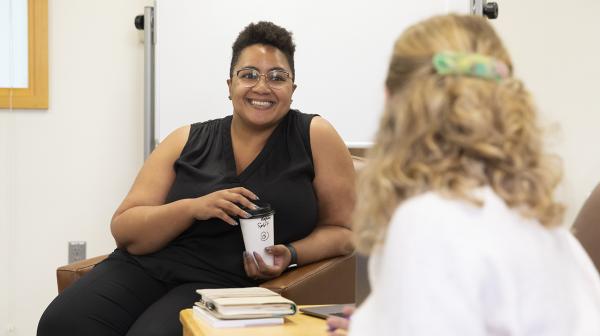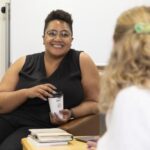
Here’s our interview with our double-alum, Regina Duthely, who received her BA in English at St. John’s in 2007 and returned later for a PhD, which she received in 2017. She’s now an Assistant Professor of English at the University of Puget Sound in Washington.
 SJU English Blog: Alumnae Interview Questions
SJU English Blog: Alumnae Interview Questions
When did you graduate from St. John’s? What degree(s) do you have from us?
BA, 2007 and PhD, 2017
What thing that you learned at SJU English do you think has been most helpful to you in your post-SJU career?
I learned so much from my courses, but the most important thing I carry with me is the importance of being a strong mentor and advocate for my students. My faculty mentors (hi Dr. Smalls, Dr. Ahmad, and Dr. Chetty!) guided and shaped me in profound ways during my time in the PhD program. They have served as a model for how I approach my current work with students.
What did your path look like from graduation to your current job?
When I finished with my BA in 2007 I wasn’t completely sure of my career path. I took a few teaching jobs and completed an MA. I returned to SJU in 2011 for my doctoral degree. I went on the job market in 2016 as I was finishing my degree, and thankfully landed a tenure track position at the University of Puget Sound in Tacoma, WA. I have been here ever since!
What does a typical day or week look like in your position?
At UPS we teach a 3/3 load. For English faculty this is generally a 100-level 1st year writing seminar, a 200-level, and a 300-level upper division course or 400-level senior seminar. We’re also required to complete at least one university service appointment. This semester I am teaching 5 days a week. I generally arrive on campus at 8am to get ready for my 9am class on Mondays, Wednesdays, and Fridays. I teach again at 11am. At 12pm I will usually head to a meeting. This year I am serving on Faculty Senate, so we meet on Mondays at 12. Usually, our full faculty meetings are held on Wednesdays. Department meetings are also fit in each month on a Wednesday without a full faculty meeting. I hold office hours in the afternoon and on Tuesday and Thursday mornings before I teach at 12:30pm. I also make sure to meet with my writing group on Tuesday afternoons to keep my research program moving forward even with a very full teaching and service schedule. Class prep, grading, and student meetings fit in here and there throughout the week. The life of a full-time faculty member is never dull!
What is your favorite part of being in your current position?
My favorite part of my current position is the flexibility I have in what I teach. I love being able to create new classes and fully immerse myself in courses that directly connect with my research interests. For example, this semester I am teaching a Black Feminist Theory course at the 300-level. My students have been so thoughtful, and talking through the materials with them has helped me think in different ways about the texts. It has been a really rewarding experience.
What are the most valuable skills you learned as an English major? How have they helped you post-graduation?
The most important thing I learned is how to be critical. As a student I honed my critical reading and thinking skills, and how to use those skills to disrupt systems. Of course, this has helped in my teaching and research, but it has also helped with navigating university systems and structures.
What is your advice to other English majors?
Find your people! Find a network of peers and collaborators both within the program and out in your field. Scholarly work is rewarding, but it is also challenging. You cannot do it in isolation. My grad school peers remain dear friends, and they are people I still collaborate with. We share drafts with each other, have writing meetups, text about teaching, and share tips for getting through when things seem most difficult. You need a support system and cheer squad, and it is also gratifying to be able to provide that for others.
How have you managed during the pandemic of 2020-21? Is there any way that being an English student has helped you in difficult times?
The pandemic has been tough! The things I learned at SJU have helped me work towards creating a more just and equitable classroom, and to push for greater equity across my campus. The work I did as a student has helped me to think in more complex ways about how systems and structures work to further marginalize some groups and communities. I think the pandemic has made that more evident, and pushes us to be better and do better for the most vulnerable among us. English studies has helped me to be able to imagine better futures, and given me the ability to push for that future in small ways through my work.

Leave a Reply